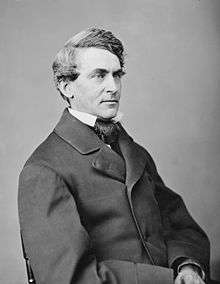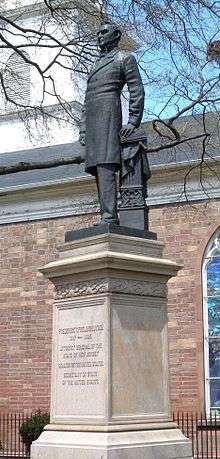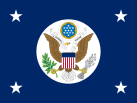Frederick Theodore Frelinghuysen
| Frederick Theodore Frelinghuysen | |
|---|---|
 | |
| 29th United States Secretary of State | |
|
In office December 19, 1881 – March 6, 1885 | |
| President |
Chester A. Arthur Grover Cleveland |
| Preceded by | James G. Blaine |
| Succeeded by | Thomas F. Bayard |
| United States Senator from New Jersey | |
|
In office March 4, 1871 – March 3, 1877 | |
| Preceded by | Alexander G. Cattell |
| Succeeded by | John R. McPherson |
|
In office November 12, 1866 – March 3, 1869 | |
| Preceded by | William Wright |
| Succeeded by | John P. Stockton |
| 22nd Attorney General of New Jersey | |
|
In office 1861–1867 | |
| Preceded by | William L. Dayton |
| Succeeded by | George M. Robeson |
| Personal details | |
| Born |
August 4, 1817 Millstone, New Jersey |
| Died |
May 20, 1885 (aged 67) Newark, New Jersey |
| Political party | Whig, Republican |
| Spouse(s) | Matilda Elizabeth Griswold |
| Relations | Frederick Frelinghuysen (father) |
| Children | Frederick Frelinghuysen |
| Alma mater | Rutgers College |
| Profession | Lawyer, politician |
| Signature |
|

Frederick Theodore Frelinghuysen (August 4, 1817 – May 20, 1885) was an American lawyer and politician from New Jersey who served as a U.S. Senator and later as United States Secretary of State under President Chester A. Arthur.
Early life and education
Frelinghuysen was born in Millstone, New Jersey, to Frederick Frelinghuysen (1788–1820) and Mary Dumont. His father died when he was just three years old, and he was adopted by his uncle, Theodore Frelinghuysen (1787–1862).
His grandfather Frederick Frelinghuysen (1753–1804) was an eminent lawyer, one of the framers of the first New Jersey Constitution, a soldier in the American Revolutionary War and a member (1778–1779 and 1782–1783) of the Continental Congress from New Jersey, and from 1793 to 1796 a member of the United States Senate.
His uncle, Theodore Frelinghuysen, was Attorney General of New Jersey from 1817 to 1829, was a U.S. Senator from New Jersey from 1829 to 1835, was the Whig candidate for Vice President of the United States on the Henry Clay ticket in the 1844 Presidential election, and was Chancellor of New York University from 1839 until 1850 and president of Rutgers College from 1850 to 1862.
Frelinghuysen graduated from Rutgers College in 1836, and studied law in Newark with his uncle, to whose practice he succeeded in 1839, after he was admitted to the bar. He became attorney for the Central Railroad of New Jersey, the Morris Canal and Banking Company and other corporations.
Marriage and children
He married Matilda Elizabeth Griswold and had three daughters and three sons, including: Frederick Frelinghuysen, George Griswold Frelinghuysen (1851-1936), Theodore Frelinghuysen (1860-1931), Matilda Griswold Frelinghuysen who married Henry Winthrop Gray, Sarah Frelinghuysen who married John J. Davis and Charles L. McCawley, and Lucy Frelinghuysen.[1][2]
His great-grandson was politician Henry Cabot Lodge Jr.
Politics
Frelinghuysen was a delegate to the 1860 Republican National Convention from New Jersey and from 1861 to 1867 was Attorney General of New Jersey. He was a delegate to the Peace conference of 1861 in Washington, and in 1866 was appointed by the Governor of New Jersey, as a Republican, to fill a vacancy in the United States Senate. In the winter of 1867, he was elected to fill the unexpired term, but a Democratic majority in the New Jersey Legislature prevented his re-election in 1869.
In 1870, he was nominated by President Ulysses S. Grant, and confirmed by the Senate, as United States Ambassador to the United Kingdom to succeed John Lothrop Motley, but declined the mission. From 1871 to 1877 he was again a member of the United States Senate, in which he was prominent in debate and in committee work, and was chairman of the U.S. Senate Committee on Foreign Affairs during the Alabama Claims negotiations.
He was a strong opponent of the Reconstruction measures of President Andrew Johnson, for whose conviction he voted (on most of the specific charges) in the impeachment trial. He was a member of the joint committee which drew up and reported (1877) the Electoral Commission Bill, and subsequently served as a member of the Electoral Commission that decided the 1876 Presidential election. As a Republican, he voted with the eight-member majority on all counts.
On December 12, 1881, he was appointed United States Secretary of State by President Chester A. Arthur to succeed James G. Blaine, and served until the inauguration of President Grover Cleveland in 1885.
Retirement and death
After his term as Secretary of State Frelinghuysen returned to his home in Newark. He died there on May 20, 1885, aged 67, less than three months after retiring. He was buried at Mount Pleasant Cemetery, Newark.
Notes
- ↑ "G.G. Frelinghuysen Dies. Son of Arthur's Secretary Of State Was Lawyer". New York Times. April 22, 1936.
- ↑ "Frederick Frelinghuysen. Ex-President of Mutual Benefit Life Insurance Company Dies". New York Times. January 2, 1924.
References
-
 This article incorporates text from a publication now in the public domain: Chisholm, Hugh, ed. (1911). "Frelinghuysen, Frederick Theodore". Encyclopædia Britannica (11th ed.). Cambridge University Press.
This article incorporates text from a publication now in the public domain: Chisholm, Hugh, ed. (1911). "Frelinghuysen, Frederick Theodore". Encyclopædia Britannica (11th ed.). Cambridge University Press.
External links
- United States Congress. "Frederick Theodore Frelinghuysen (id: F000369)". Biographical Directory of the United States Congress.
- Biographical information for Frederick T. Frelinghuysen from the Political Graveyard
 "Frelinghuysen, Theodorus Jacobus". Appletons' Cyclopædia of American Biography. 1900.
"Frelinghuysen, Theodorus Jacobus". Appletons' Cyclopædia of American Biography. 1900.
| Legal offices | ||
|---|---|---|
| Preceded by William L. Dayton |
New Jersey Attorney General 1861–1866 |
Succeeded by George M. Robeson |
| United States Senate | ||
| Preceded by William Wright |
U.S. Senator (Class 1) from New Jersey 1866–1869 Served alongside: Alexander G. Cattell |
Succeeded by John P. Stockton |
| Preceded by Alexander Cattell |
U.S. Senator (Class 2) from New Jersey 1871–1877 Served alongside: John P. Stockton, Theodore F. Randolph |
Succeeded by John R. McPherson |
| Political offices | ||
| Preceded by James G. Blaine |
U.S. Secretary of State Served under: Chester A. Arthur 1881–1885 |
Succeeded by Thomas F. Bayard |

